
8 minute read
Sustainability
Sustainability represents UP’s resilience to survive disruption and change, and UP is resolutely building a culture that connects to healthy economic, social and environmental systems.
54
56 Ensuring continued financial sustainability Building a sustainable infrastructure
UP’s commitment to sustainability permeates all aspects of UP’s institutional life.
It may be as obvious as ensuring student success and retention or using its natural resources wisely. It may be as subtle as diversifying revenue streams or investing in appropriate information and communication technology.
ENSURING CONTINUED FINANCIAL SUSTAINABILITY
Financial sustainability is crucial for the future of UP and the higher education sector at large. No fee increases or limited increases in tuition fees since 2016 has led to concerns about the stability and financial sustainability of the higher education sector in general.
In order to maintain its financial health, UP developed a financial sustainability plan, which was approved by the Council of the University. The main purpose of the plan is to develop a university-wide programme, "SustainUP", to which students and staff contribute through innovative and entrepreneurial initiatives to the long-term sustainability of the University.
Key actions to achieve the goals of the plan include: • Investing in student success through a “smart enrolment approach” that focuses on growth at postgraduate level, an increase in international student numbers and the development of a fullyfunded student model. Addressing the challenges of student completion and success rates, which have an impact on subsidy income. Managing human resources to ensure a high performance ethic among all staff and optimal support for the University’s strategy. Promoting the concept of efficient and effective operations that are managed well in terms of cost and incorporate the value-for-money principle. Enhancing the use of information technology (IT) to improve services and reduce costs. The University will continue to prioritise IT projects that enhance efficiency, improve operations and administrative processes, and enrich teaching, learning and research. Maintaining, developing and using the University's fixed assets and facilities, including income-generating assets (such as venues and sporting facilities), to meet its future academic, research and social needs, strengthen project management capabilities internally, maintain environmental sustainability, and optimise and repurpose space and facilities, where possible. Generating third-stream income, including fundraising campaigns, and developing partnerships aimed at external research funding.
The gardens at Future Africa were designed to cultivate and produce edible and indigenous plants. The landscape provides a living and functional testament of a predominantly indigenous landscape as food resource.
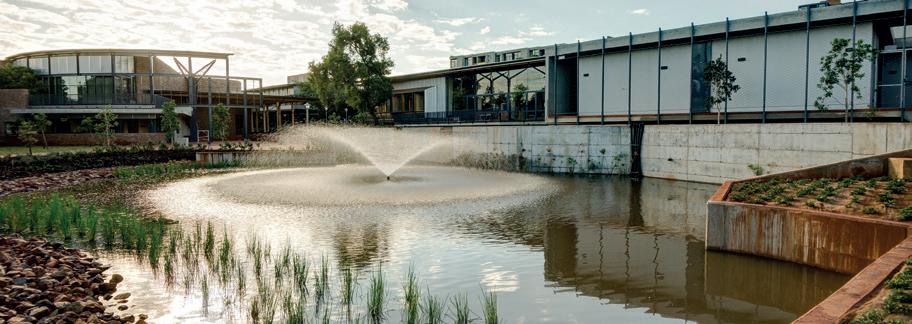
Alternative funding streams
Enterprises University of Pretoria Proprietary Limited (Enterprises UP), which develops, implements and manages the business activities of the University, plays a significant role in generating alternative sources of funding. The company successfully expanded its footprint in the business and governmental sectors in South Africa and internationally, resulting in a total turnover of R237m in 2019.
Research Solutions generated research funding to the value of R78m through its applied research outputs, offering more than 50 areas of functional expertise and capability. Training Solutions generated development and training funds to the value of R159m by diversifying its catalogue of 537 customised training programmes and short courses, thus contributing even more substantially to socio-economic development in South Africa and beyond.
More than 370 public institutions and 950 companies in South Africa made use of the contract research and consulting offerings and training products.
Donor funding
The 2019 fundraising target was R90m and by the end of December 2019, R150m had been raised. New donors included the African Rainbow Minerals Education Trust that donated R7m to fund the UP Technology Fund, enhancements in nuclear medicine research and further research into the world’s first middle ear transplant.
Other first-time donors are Total SA (R1m), KSB Pumps (R1.2m) and Bollore Logistics (R1m). These funds are for bursaries to assist previously disadvantaged students to continue their studies. Major bursary donations were also received from IBM (R500 000); Widney (R113 000); Shaping Futures (R360 000); FassetSETA (R9.8m); InSETA (R1.4m); Samsung (R1.4m); SAP (R8.8m); and the MasterCard Foundation (R49m as an annual grant).
Further significant new donations included: • National Skills Fund: R23.7m for the Faculty of
Veterinary Science to establish wildlife teaching facilities • The Dippenaar Family Trust: R10m towards the Javett-
Sustainability at UP means:
• Financial sustainability in terms of solvency, liquidity and cash flow • An ecologically and economically sustainable infrastructure • A UP precinct that creates an enabling environment for staff and students to excel • A diverse and talented cohort of students, academic and professional staff • Integration of sustainability principles in all University operations.
UP, a contribution recognised in the naming of one of the galleries Kresge Foundation: R1.3m (the final tranche of a R4.5m grant) for the Hatfield and Mamelodi anchor projects.
The Andrew Mellon Foundation made substantial donations to two projects in the Faculty of Humanities: • Entanglement, Mobility and Improvisation: Culture and Arts in Contemporary African Urbanism and its
Hinterlands (R10.3m). • Critical Food Studies: Transdisciplinary Humanities
Approaches, which UP will undertake with the
Universities of the Western Cape and Kwa-Zulu Natal (total value R12m, with R3.4m being the UP portion).
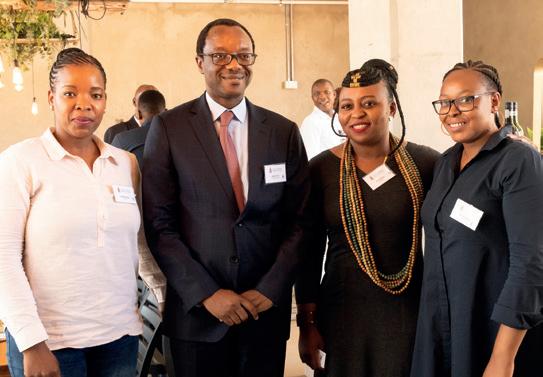
UP Vice-Chancellor and Principal Prof Tawana Kupe with guests during the inaugural donor appreciation event which was held at the Javett-UP Art Centre.
BUILDING A SUSTAINABLE INFRASTRUCTURE
UP’s Spatial Development Plan was developed in 2019 to provide direction for the future physical development of the University.
UP’s infrastructure includes more than 700 buildings dating back to the early 1900s. More than one-third of the buildings are classified as heritage buildings and are subject to the provisions of the National Heritage Resources Act 25 of 1999. The University has a conservation management plan to ensure the sustainability of these buildings.
The planning, design and construction of sustainable infrastructure are key elements of the University’s approach to sustainability. All newly designed buildings and refurbishment projects focus on energy-efficient designs with regard to power and water usage, waste handling as well as ventilation and air-conditioning.
The University has entered into a Power Purchase Agreement (PPA) to supplement its electricity supply by installing photovoltaic (PV) panels on various existing and new buildings. This project started in 2018 and was expanded in 2019.
An emergency back-up water system has been installed at the Onderstepoort Campus and a newly established water management task team is investigating other water
Enhanced ICT infrastructure and WiFi coverage is improving the teaching and learning experience. harvesting initiatives, including retention ponds and sustainable urban drainage systems.
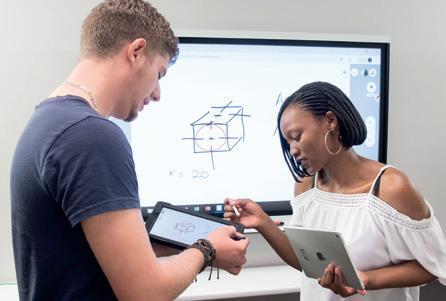
ICT infrastructure
The University aims to ensure that its ICT systems keep abreast of international developments to address the needs related to the 4IR and beyond, as well as to use ICT as a resource for UP’s scientific work, its management of knowledge, interaction with students and staff, and for the efficient administration of the University. In 2018, UP improved the ICT infrastructure for research and reviewed the networking infrastructure with a specific focus on cyber security issues. UP’s first mobile application was successfully launched during August 2019.
Technology in lecture venues and student computer laboratories is continuously being enhanced in order to improve the teaching and learning experience. In 2019, UP expanded high-density Wi-Fi coverage to 400 lecture venues across all campuses, upgraded Audio Visual equipment in lecture venues, and renewed technology in Student Computer Laboratories. The Wi-Fi infrastructure within lecture venues has made it possible to launch the mobile clicker project. Students are now able to use clicker software from their mobile devices, which negates the use of expensive proprietary clicker systems.
An increasing number of students are making use of their personal computing devices for academic work or to access the Internet and other UP systems through the Wi-Fi network. This has led to a dedicated Student IT Hub being established to provide technical support to students. The team supports more than 7 000 students annually. Poor student computer literacy has been identified as one of the contributing factors to the less than satisfactory first-year success rate at the University and a project was initiated to identify a suitable software solution to address this challenge.
To ensure uninterrupted service, UP also upgraded its IT servers and data storage facilities. This included establishing a second data centre to address the risk associated with recovery of institutional data in the event of damage to the current single data centre. The server hardware upgrade has been completed, while the second
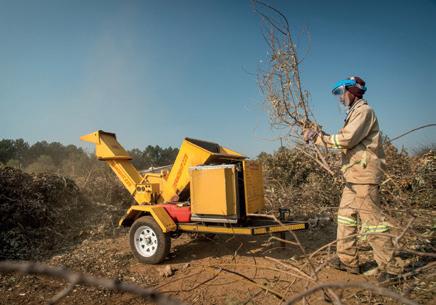
data centre is in operation. Software migration to the new platform is expected to be completed by the end of 2020.

Effective conservation strategies
Over the past ten years UP has been working to save energy, and to reduce water consumption as well as its carbon footprint. In 2019, we saw a small saving of 0.02% in water consumption compared to 2018 even though two large facilities, Future Africa and Javett-UP, were added. The savings amounted to R2.58m.
Furthermore, UP reduced electricity consumption by 4.18% compared to 2018, which contributed to a saving of R9.5m. This includes the cost of the Power Purchase Agreement where 462MWh was generated from solar power installations.
UP is a major generator of general waste (recyclable, food waste and garden waste). During 2019, a total of 167 072kg of waste was recycled and an amount of R187 768 was received in rebates. This was a 19.76% increase in recycling compared to the same period in 2018. Recycling activities in 2019 contributed to saving 2 423 trees, 214 472 litres of oil, 5 880 395 litres of water, 1 154m3 of landfill space and 4 555 402t CO2 e pollutants.
Upgrading of the compost and mulch production facility on the Hillcrest Campus has substantially decreased the need to transport garden refuse to landfill sites. We produced compost and mulch to the value of approximately R1.6m and this was used on all the University property. The use of mulch in plant beds on UP campuses and properties will result in a decreased need for irrigation water, the prevention of weed infestation and the creation of healthier soils.
Recycling gains 167 072kg Waste recycled 19.7% Increase in recycling efforts
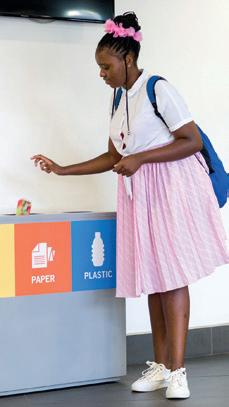
What we saved through recycling
Fundraising success
Target R90m Actual R150m
Enterprises UP contribution to UP funds
n Research Solutions R78m
67+
n Training Solutions R159m
UP infrastructure
n 700 Buildings
33+
n 1/3 classified as heritage buildings







